Anger is a normal and natural emotion, but when it becomes irrational, it can lead to problems. In this article, we will look at what anger is, the different types of anger, and how to deal with them. We will also provide tips on how to deal with irrational anger healthily.
Contents
What Is Irrational Anger?

Irrational anger is a type of anger that is not based on reality. It can be caused by a variety of things, such as feeling threatened, feeling belittled or humiliated, or overwhelmed.
There are a few different reasons why someone might experience irrational anger. If you feel like you’re getting angry at inanimate objects or people who don’t deserve it, it might be due to a fear of being overwhelmed or threatened. Also, If your anger is uncontrollable and doesn’t have any rational basis, that might be a sign that you’re dealing with an emotional issue such as depression or anxiety.
If you find yourself getting angry for no good reason, there are a few things you can do to help manage the situation. First, try to identify the underlying cause of your anger. Once you know what’s fueling it, you can start to work on addressing the root of the problem. Additionally, try to practice relaxation techniques and learn how to control your anger in future situations. Finally, talk to someone about how your anger is impacting your life – they may be able to provide some helpful advice.
Causes of Irrational Anger
There are many possible reasons that someone might experience irrational anger, but some of the most common include:
stressors in life, such as relationship issues or financial pressures
One of the most common causes of anger is when people feel like they’re not being heard or that their concerns are being dismissed. When this happens repeatedly, it can lead to feelings of frustration and anger.
having low self-esteem or feeling like people don’t appreciate them
People who have low self-esteem often feel like they can’t control their emotions, which can lead to anger when things don’t go their way.
excessive drinking or drug use
When people drink or use drugs in an attempt to numb the pain of their emotions, it often has the opposite effect. This can lead to feelings of frustration, anger, and anxiety, as well as a decreased ability to cope with stress.
biological factors, such as genetics or hormones
Certain genetic factors can increase a person’s vulnerability to experiencing anger problems. Additionally, hormones – such as estrogen – can play a role in how easily someone becomes angry.
a history of being bullied or experiencing abuse
Also known as emotional abuse, this type of abuse can lead to anger problems. This is because it causes people to feel powerless and unsupported.
having a personality disorder
A personality disorder is a condition that affects how a person behaves and thinks. Some of the most common personality disorders include borderline personality disorder, antisocial personality disorder, and narcissism. People with these conditions are often Unable to properly control their emotions, which can lead to anger problems.
Does Irritation Anger Affect Anyone?

Irrational anger is defined as intense and frequent anger that is out of proportion to the situation. It can be a problem for people of all ages, but it can be especially difficult to deal with for young adults who are just beginning to establish themselves in the world. Reasons for irrational anger are often based on misunderstandings or anger over injustices that haven’t yet been resolved.
The effects of this irritation and anger can also be felt by those close to the person experiencing it. They may feel frustrated and disconnected from the individual, and they may struggle to understand why the anger is being expressed in such a way. This can lead to tension in the relationship and increased conflict.
Some of the impacts may be as:
Impacts on physical health
People who experience a lot of irritation and anger may have an increased risk of developing problems with their heart or blood pressure. They may also find it more difficult to relax and get enough sleep, which can have negative impacts on their overall health.
Impacts on mental health
Irritation and anger can lead to feelings of anxiety and stress, which can hurt mental health. This is especially true for people who are already struggling with an existing mental illness. It can be difficult to cope with the intense emotions that are associated with this type of anger, and it can be hard to find ways to manage them effectively.
Impacts on relationships
People who struggle with irritation and anger often have difficulty maintaining healthy relationships. This is because they may be quick to anger, and they may not be able to control their reactions. This can lead to tension in the relationship, as well as resentment from those who are affected.
How To Deal With Irrational Anger?

Irrational anger is a feeling that is irrational and out of proportion to the situation. It is often accompanied by feelings of rage, hostility, and frustration.
There are many reasons why someone might experience irrational anger, and it can be difficult to know when to address the issue. Here are some tips on how to deal with this type of anger:
1. Recognize that you are feeling angry and try to identify the reason for your anger. This will help you better understand why your anger is happening and help you to control it.
2. Avoid reactively engaging in arguments or confrontations with those who upset you. Instead, try to find ways to calm down and diffuse the situation without involving other people. This may mean taking a few deep breaths, writing down your thoughts, or talking to a trusted friend or family member about what is going on.
3. Don’t bottle up your anger. If you feel like you need to express your anger in a destructive way, such as through violence or verbal attacks, try to talk about it with someone. This is someone who can help you manage your emotions safely. It is also important to remember that not all angry behavior is bad; sometimes constructive anger can be a powerful force for change.
4. Try to avoid dwelling on your anger and the situation that caused it. This can only lead to further aggravation. Instead, focus on taking care of yourself emotionally and mentally by doing things that make you happy or helping others in need.
5. Seek professional help if your anger is proving to be a difficult burden to manage. A therapist may be able to provide guidance and support as you work through your anger. Make sure to discuss any concerns you have about seeking help, as there may be some risks associated with doing so.
6. Commit yourself to taking the time necessary to vent and healthily process your anger. This will help you to maintain control and prevent irrational anger from spiraling out of control. Sometimes is helpful to talk about your anger in writing, to keep track of your thoughts and feelings over time.
Conclusion
Anger has always been a powerful emotion, and it can be incredibly difficult to deal with when it’s out of control. In this article, we have explored what irrational anger is. Also, it’s different types and why they arise, and how to deal with them in the most effective way possible. Hopefully, by reading this you’ll be better equipped to identify your anger triggers and recognize when you’re starting to lose control. This is so that you can take the appropriate steps to address the issue.
Hope this article was of help to you! If you are suffering from mental health disorders, you may seek help from Therapy Mantra. We have a team of highly trained and experienced therapists who can provide you with the tools and skills necessary for overcoming mental health disorders. Contact us today to schedule an online therapy or download our free Android or iOS app for more information.


